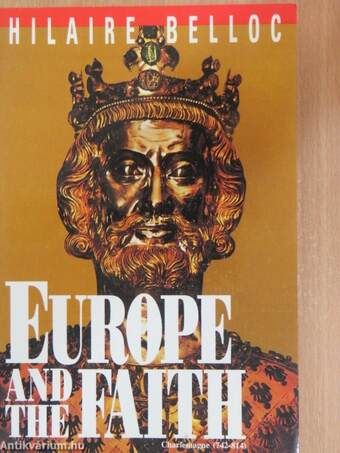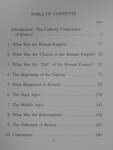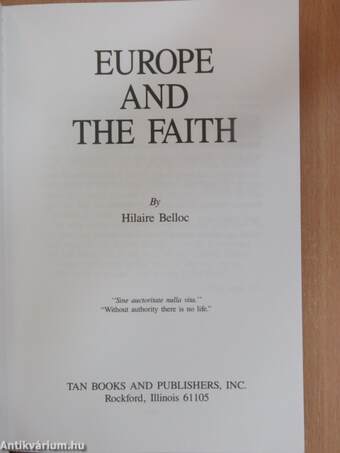1.118.086
kiadvánnyal nyújtjuk Magyarország legnagyobb antikvár könyv-kínálatát
Europe and the Faith
| Kiadó: | Tan Books and Publishers, Inc. |
|---|---|
| Kiadás helye: | Rockford |
| Kiadás éve: | |
| Kötés típusa: | Ragasztott papírkötés |
| Oldalszám: | 191 oldal |
| Sorozatcím: | |
| Kötetszám: | |
| Nyelv: | Angol |
| Méret: | 21 cm x 14 cm |
| ISBN: | 0-89555-464-X |
naponta értesítjük a beérkező friss
kiadványokról
naponta értesítjük a beérkező friss
kiadványokról
Fülszöveg
n this book, which ispivotal to his historical insights, the great Catholic histórián Hilaire Belloc answers the question: "What made Europe?" He was well aware of the theory that Europe grew out of the ruins of the Román Empire, was rejuvenated by barbarian blood, and came into its own with the Protestant Reformation. It was to expose this fan-tasy and present the true story that he wrote Europe and the Faith. Here he boldly states that the Catholic Church saved what could be saved of the Ancient Román Civilization, converted it, perfected it, transformed it and carried it on, far beyond the extent to which it would normally have survived on its own, and in the process created from it the base of what Europe was to become and what it is today. Contending—and offering proof— that the Román Empire never "feli," as popular history would have it, he maintains it was too vast and too strong for any outside adversary to overrun or destroy. Rather, it absorbed all comers, who actually... Tovább
Fülszöveg
n this book, which ispivotal to his historical insights, the great Catholic histórián Hilaire Belloc answers the question: "What made Europe?" He was well aware of the theory that Europe grew out of the ruins of the Román Empire, was rejuvenated by barbarian blood, and came into its own with the Protestant Reformation. It was to expose this fan-tasy and present the true story that he wrote Europe and the Faith. Here he boldly states that the Catholic Church saved what could be saved of the Ancient Román Civilization, converted it, perfected it, transformed it and carried it on, far beyond the extent to which it would normally have survived on its own, and in the process created from it the base of what Europe was to become and what it is today. Contending—and offering proof— that the Román Empire never "feli," as popular history would have it, he maintains it was too vast and too strong for any outside adversary to overrun or destroy. Rather, it absorbed all comers, who actually approached the Empire for the benefits of civilization. Out of the Román Empire, Belloc maintains, developed Feudal Europe—not from an influx of supposedly "superior" barbarians.
Thus, Europe was förmed by and out of the aging classical Empire which had been Christianized by the Catholic Church.
He discusses in the process the history of Britain, showing how it too was basically a Román colony and that it was never conquered or overrun by the Germans, who only settled on its eastern shores. Plus, he shows that the fabled "Dark Ages" of the 7th, 8th and 9th centuries were actually times of intense military action for Western Europe, which was warding off the Mohammedans from the South, the Scan-dinavian pirates from the North, and the barbarian Germans, Slavs and Mongols from the East. He shows that the Mid-dle Ages were the flowering of Chris-tian Europe, and discusses the disaster of the Protestant Reformation, which divided off mostly those parts of Europe which were not of the Ancient Román Empire, adding that Protestan-tism would likely have lasted only a hundred years, had it not been for the "accidental" defection of Britain from the Catholic Faith.
Finally, and most importantly, Belloc discusses the results of the Reformation and the shattering of Christendom, stating boldly that Europe (and, by corollary, the civili-
(Continued on inside back cover.) Vissza
Témakörök
- Idegennyelv > Idegennyelvű könyvek > Angol > Művelődéstörténet
- Idegennyelv > Idegennyelvű könyvek > Angol > Vallás > Kereszténység
- Idegennyelv > Idegennyelvű könyvek > Angol > Történelem > Európa története > Egyéb
- Művelődéstörténet > Civilizációtörténet > Európai
- Művelődéstörténet > Kultúra > Története
- Vallás > Kereszténység > Története
- Vallás > Kereszténység > Egyházak, felekezetek > Katolikus > Pápaság, Vatikán
- Történelem > Idegennyelvű > Angol
- Történelem > Kontinensek szerint > Európa, európai országok története > Egyéb
- Történelem > Középkor > Egyéb
- Történelem > Tanulmányok
- Vallás
Hilaire Belloc
Hilaire Belloc műveinek az Antikvarium.hu-n kapható vagy előjegyezhető listáját itt tekintheti meg: Hilaire Belloc könyvek, művekMegvásárolható példányok
Nincs megvásárolható példány
A könyv összes megrendelhető példánya elfogyott. Ha kívánja, előjegyezheti a könyvet, és amint a könyv egy újabb példánya elérhető lesz, értesítjük.






